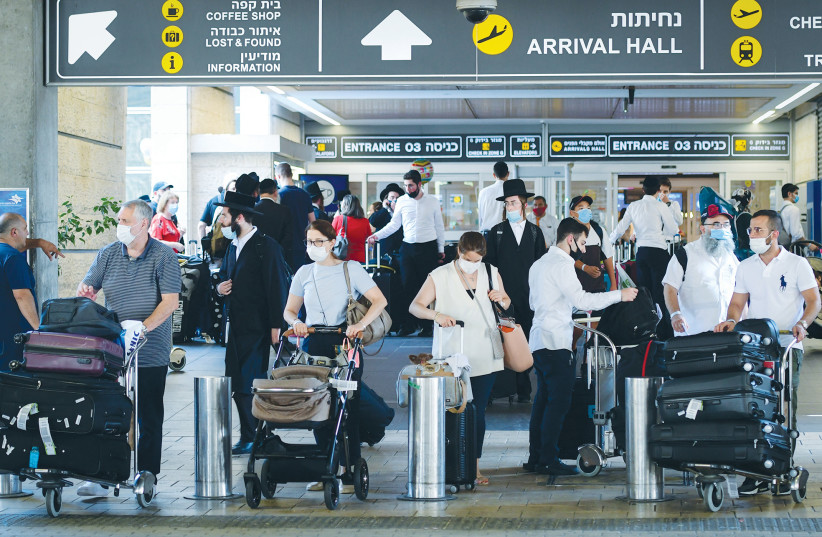The new outline for incoming tourists began on November 1, with individual travelers who meet the criteria able to arrive in the country without any special permission. The concept is to open the skies to more travelers interested in visiting the Jewish state.
“The Israel Ministry of Tourism is pleased to welcome the long-awaited return of vaccinated individual tourists,” the ministry said Sunday in a statement. “Once again, tourists from around the world can make their reservations and enjoy the unique, varied and safe tourism products that Israel has to offer.”
However, on Sunday night, hundreds of travelers were stuck at airports unable to board their flights until the airlines were updated about the new policy and told they could let people board based on their vaccination documents.
A special form, which travelers were being asked to fill out, was not yet updated according to the new rules, and a source in the Health Ministry said it was not intended to be updated until around noon on Monday – well after people traveling to Israel from some places abroad would need it to get their Green Passes and qualify for entry.
Assuming the pieces falls into place, with the help of the Health Ministry, here are the details you need to know if you are eligible to enter Israel and, if so, how to do it:

Who can enter Israel?
Any foreign national who:
- Has been vaccinated with a vaccine approved by the World Health Organization or with the Sputnik V Russian vaccine, but only in accordance with certain conditions (see below)
- Recovered from coronavirus within the last six months or received a booster shot since recovering more than six months ago, but only in accordance with certain criteria (see below)
- Did not spend time in a “red” country with high infection rates during the 14 days prior to arriving in Israel
- Arrives via Ben-Gurion Airport.
Which vaccines have WHO approval?
- Moderna
- Pfizer
- Johnson & Johnson/Janssen
- AstraZeneca
- Covishield
- Sinopharm
- Sinovac.
What are the rules for vaccinated visitors?
For all WHO-approved vaccines, except Johnson & Johnson, the following criteria apply:
- At least 14 days have passed since the individual received two shots of these vaccines or a booster and no more than 180 days.
For those who received the Johnson & Johnson vaccine:
- At least 14 days have passed since the individual received the Johnson & Johnson vaccine (Johnson & Johnson is a one-shot vaccine) and no more than 180 days.
What about a recovered person?
- People who have recovered must be able to have a reference that the Health Ministry system can digitally authenticate, i.e, a recovery certificate or PCR test
- The person must have been infected at least 11 days prior to attempt of entry and no more than 190 days, unless the person has received a booster dose of a WHO-approved vaccine.
Is Sputnik V different?
- Foreigners vaccinated with Sputnik can only begin entering the country November 15 and are required to take a serological test on arrival. Only when a positive serological result is received can these individuals leave isolation
- These individuals must have received two shots or a booster of the Sputnik V vaccine at least 14 days before entry and no more than 180 days before
- If a person who received Sputnik arrives and the serological test is negative, the traveler will be able to choose between staying in Israel in isolation for a minimum of seven days or immediately returning home.
What must be done before entering Israel?
- A PCR test up to 72 hours before boarding the plane, which will need to be presented at the gate
- Passengers need to upload either their verifiable digital vaccine or recovery certificate or their paper certifications to the incoming passenger form on the Health Ministry website to receive their Green Pass before travel. If a person does not have a digital certificate, the individual will also need to fill out an application to shorten the isolation period to receive a Green Pass; such documentation will also need to be presented
- A recovered individual will also need to bring this digitally recovery certificate
- Before boarding, individuals who do not meet this criteria but received an exceptional entry permit from the Interior Ministry will also need to present this documentation
- Travel insurance is also required.
What happens upon entry?
- People must take a PCR test at the airport and wait in isolation until they receive a negative result and 24 hours have passed
- Those vaccinated with Sputnik V must take both a PCR test and a serological test
- If a person tests positive for COVID-19 during their stay in Israel, the individual will be transferred to a hospital or state-run coronavirus hotel under the auspices of Home Front Command. All medical treatment will be at the expense of the foreigner and the individual’s insurance policy.
What are the penalties for breaking the rules?
- A foreigner who presents a forged document will be denied entry to Israel for five years
- A foreigner who tests positive for COVID-19 but refuses to stay at a hotel or violates the isolation rules will be denied entry to Israel for five years
- A foreigner who was not found positive for COVID-19 but still violates isolation rules will be denied entry to Israel for three years.
